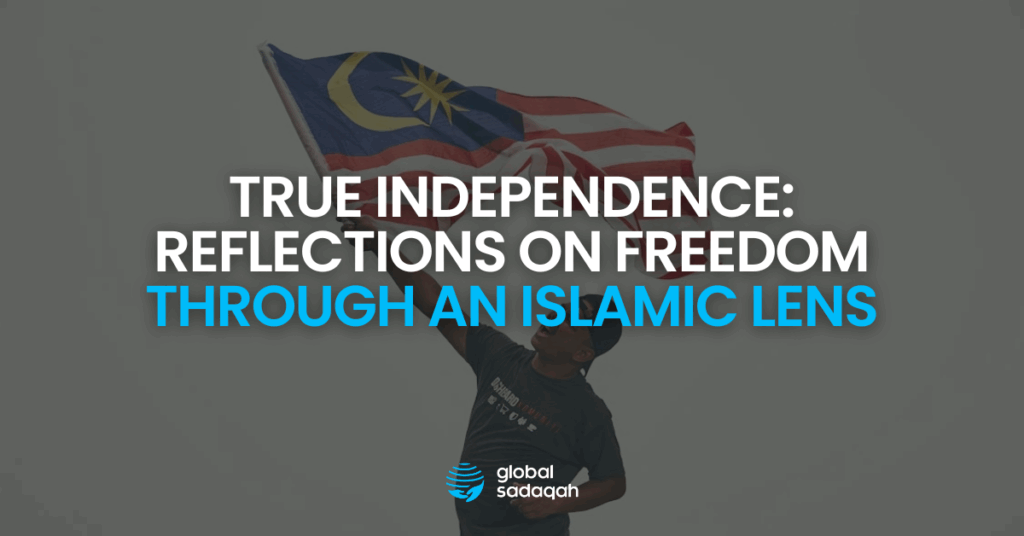Independence Day is often celebrated with flags waving high, parades filling the streets, and patriotic songs echoing through the air. It is a day of remembering struggles, sacrifices, and victories that brought nations freedom from colonial rule or oppression.
But as Muslims, Independence Day invites us to reflect deeper: what does true independence really mean? Beyond political sovereignty, Islam teaches that independence is not only about borders and governments — it is about freeing our hearts and souls from everything that enslaves us except Allah ﷻ.
Freedom Beyond Borders
A nation may raise its flag in triumph, yet its people may still be imprisoned by greed, arrogance, injustice, or desires. Islam reminds us that the highest form of freedom is submission to Allah, because only in His worship are we truly liberated.
Allah says in the Qur’an:
“And whoever submits his face to Allah while being a doer of good — then he has grasped the most trustworthy handhold, and to Allah will be the outcome of all matters.” (Qur’an 31:22)
In other words, true independence is freedom for Allah, not just freedom from rulers.
Stories of True Independence from the Sahabah (RA)
The lives of the Sahabah (RA) are full of lessons about liberation, resilience, and spiritual independence. They show us that independence is not just political, but deeply personal and spiritual.
Bilal ibn Rabah (RA): Freedom in Faith
Born into slavery, Bilal was brutally tortured for declaring his belief in the Oneness of Allah. Yet, even as he lay on the hot sands of Makkah under the weight of stones, his heart was freer than those who oppressed him. His cry of “Ahad, Ahad” (One, One) was a declaration of independence — that no matter what chains bound him physically, his soul was bound only to Allah.
Salman al-Farisi (RA): Breaking Free Through Seeking Truth
Salman’s life is a journey of independence. He broke free from his Persian heritage, wealth, and comfort, searching across lands for the truth. His independence did not come from belonging to a certain nation or tribe, but from finding Islam and surrendering to Allah. His story reminds us that real freedom begins when we search for truth with sincerity.
Umar ibn al-Khattab (RA): Simplicity as Strength
As Khalifah, Umar ruled over vast territories, yet he lived with remarkable humility. He was once found sleeping under a tree without guards, because his justice and trust in Allah made him fearless. For Umar, true independence was not in wealth or power, but in simplicity, humility, and standing firmly for justice.
Abu Bakr as-Siddiq (RA): Using Freedom to Free Others
Abu Bakr (RA) showed his independence from worldly possessions by using his wealth to free slaves and support the Muslim community. He understood that wealth is not a master but a tool — and the one who spends in the way of Allah is the one who is truly free.
Habits That Cultivate True Independence
The Sahabah’s stories are not just history — they are guides for us today. Here are some habits we can practice to nurture true independence in our lives:
- Gratitude (Shukr): Freedom starts with recognizing the blessings Allah has given us. Gratitude protects us from becoming enslaved by endless desires.
- Charity (Sadaqah): By giving freely for Allah’s sake, we declare that our wealth does not own us — instead, we own it when we spend it in goodness.
- Salah & Dhikr: Every prayer, every remembrance, is a personal declaration of independence — bowing only to Allah, never to man.
- Simplicity in Lifestyle: Living within our means, avoiding extravagance, and staying humble frees us from the burden of showing off or chasing status.
- Service to Others: By helping the poor, supporting the oppressed, and spreading mercy, we liberate our hearts from selfishness and greed.
Independence Day: A Spiritual Reminder
As our nations celebrate independence, let us also celebrate the spiritual independence that Islam offers. Political freedom may protect borders, but spiritual freedom protects hearts.
The Prophet ﷺ said:
“The strong person is not the one who overcomes others, but the strong one is the one who controls himself when angry.” (Sahih al-Bukhari & Muslim)
This hadith reminds us that real independence is not about dominating others but mastering ourselves.
✨ True independence is to live by “La ilaha illallah” — free from fear, pride, greed, and despair.
So as we raise our flags this Independence Day, let’s also raise our hands in du‘a, thanking Allah for the blessings of freedom, and let’s raise our hearts in commitment to live as truly independent servants of Allah.

